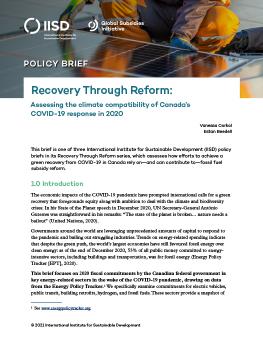
Recovery Through Reform: Assessing the climate compatibility of Canada's COVID-19 response in 2020
This brief focuses on 2020 fiscal commitments by the Canadian federal government in key energy-related sectors in the wake of the COVID-19 pandemic, drawing on data from the Energy Policy Tracker.
-
According to the Energy Policy Tracker, from March to December 2020, the federal government had committed at least CAD 14.7 billion to "clean" energy, compared to CAD 3.6 billion for "fossil" energy and CAD 4.7 billion for "other" energy.
-
Less transparent and available data is available for "fossil energy" commitments in Canada, making it significantly harder to track.
-
In 2020, government made significant announcements for building retrofits, electric vehicles, public transit, and more. However, some pledges are below best practices in other countries who are leading on green recovery, and trends in fossil fuel support are concerning.
Governments around the world are leveraging unprecedented amounts of capital to respond to the pandemic and bailing out struggling industries. Trends in energy-related spending indicate that despite the green push, the world’s largest economies have still favoured fossil energy over clean energy.
We evaluate energy-related spending in Canada in 2020 (since the onset of COVID-19), using data from the Energy Policy Tracker. Trends in Canada are then compared to flagship policies in key jurisdictions with recent progressive climate policy announcements, including France, Germany, and the United Kingdom. The brief ends with broad recommendations on how Canada can better align its recovery funding with climate action and fossil fuel subsidy reform.
This brief is one of three International Institute for Sustainable Development (IISD) policy briefs in its Recovery Through Reform series, which assesses how efforts to achieve a green recovery from COVID-19 in Canada rely on—and can contribute to—fossil fuel subsidy reform.
Funded by
You might also be interested in
Increased Support Needed to Achieve India's Clean Energy Goals
India is on track to achieve many of its 2030 clean energy goals but needs to step up government support measures to accelerate the deployment of offshore wind, electric vehicles, and green hydrogen, according to a new report.
Ending Export Credits for Oil and Gas: How OECD countries can end 2024 with a climate win
For a year now, Organisation of Petroleum Exporting Countries (OECD) governments have been negotiating an agreement that could put an end to oil and gas export finance. Following the acrimony in Baku, this would be a very real way for the OECD to show policy coherence, respond to calls from the poorest countries to stop subsidizing fossil fuels, and shift public finance to solutions.
Fossil Fuel Production, Renewable Energy, and Subsidy Reform in Nationally Determined Contributions 3.0
This policy brief provides an analysis of the critical benchmarks and recommendations necessary for aligning nationally determined contributions (NDCs) with the 1.5 °C target.
Powering the Clean Energy Transition: Net-Zero electricity in Canada
This brief explains how a shift to clean power generation can offer affordable, reliable electricity, benefiting households and businesses alike.